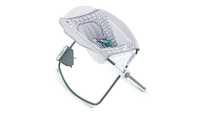
At issue is the possibility of the infant rolling over in their sleep. If properly restrained, the likelihood of such an occurrence is minimal. However, in cases where the rocker’s restraints aren’t used, the design of the rocker can allow the baby to roll from its back to its stomach or side. This could lead to suffocation of the infant.
Fisher-Price maintains that the rocker “meets all applicable safety standards.” However, the pediatrics group says that the warnings that come with the Rock ‘N Play don’t go far enough in describing the risks of the device and what can happen in the worst-case scenario.
The Rock ‘N Play has had a rocky existence outside of the United States. In Australia, parents have actually been warned to “keep the product away from children.” Canadian regulators have ruled that the rocker can’t actually be used for sleeping infants and that the device is a “soother” rather than a “sleeper.” In fact, as explained by The New York Times, regulations in Canada specifically mandate that the Rock N’ Play not be used for unattended sleep.
The extent of regulations on the rocker in non-American markets has some wondering why it has taken this long to catch the eye of US regulators and to stir them to action. Pamela Gilbert, the former executive director of the Consumer Product Safety Commission, says she has noticed a significant decrease in the number of recalls coming out of her former agency and calls it a “very dangerous trend.”
